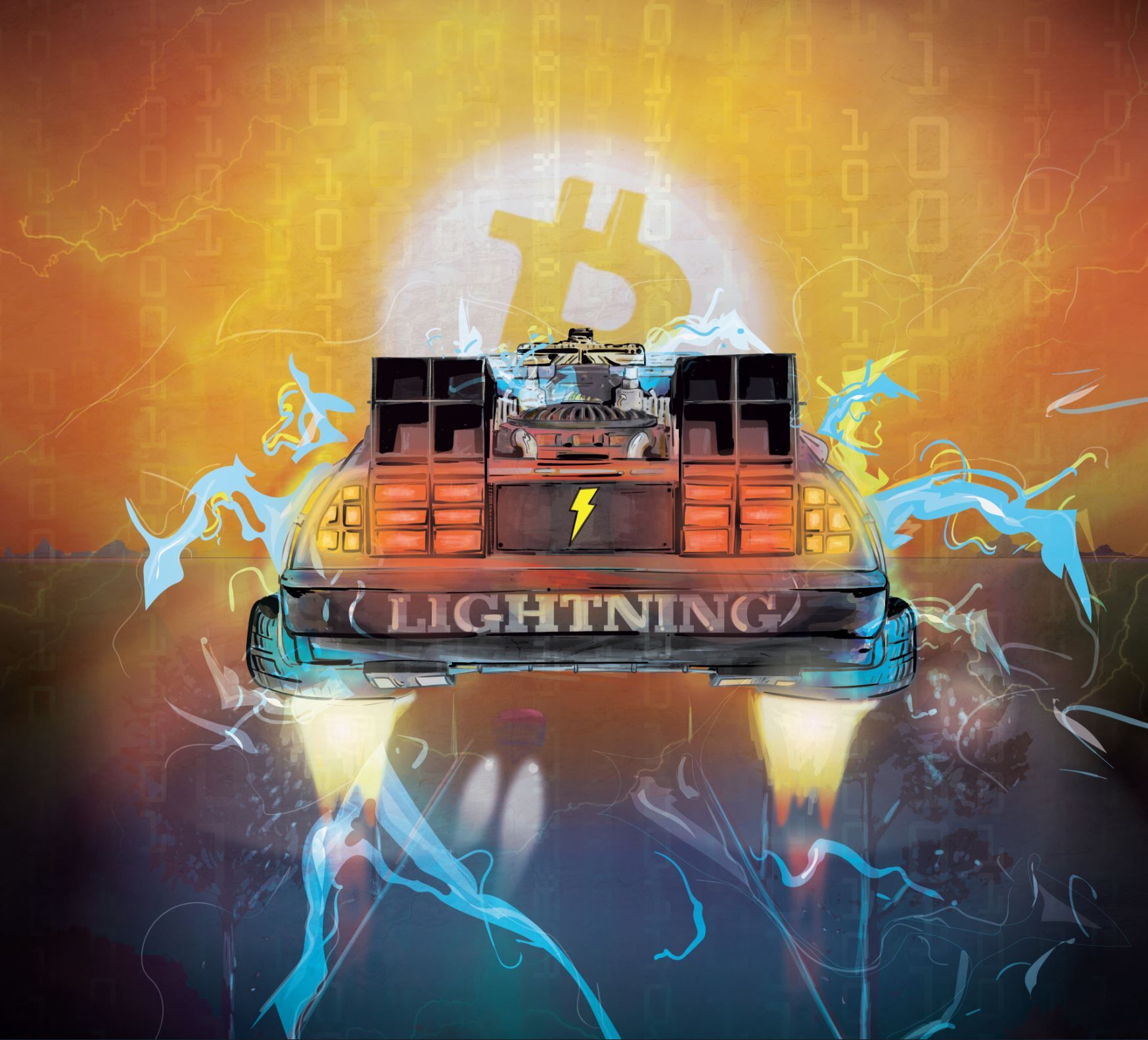Published: dergigi.com | Released: EINUNDZWANZIG Magazine|
Author: Gigi
Translation: Sinautoshi 21.05.2023 - 790758
Lightning changes everything. It's not the only solution, and it's not the end of the line, but it changes everything nonetheless. Lightning is Bitcoin, and it frees up Bitcoin. Lightning makes sats flow, enables light speed without credit. It puts sound money into meat- and cyberspace, and it changes everything.
Money and credit
Bitcoin is the answer to a question: what money is, what money was, and what money can be. Bitcoin is not credit, not an IOU for an external thing. Bitcoin is the thing itself. A digital commodity with no external dependencies, no counterparty risk.
Bitcoin is an information construct, and yet it is physical. The coupling to physics makes Bitcoin real, and this coupling brings limitation. Not only the limitation of the commodity itself to 21 million, but also the limitation of the transfer of that commodity - one block, every 10 minutes.
It is these 10 minutes that bring the commodity Bitcoin into circulation. Sats are found - not created, found - every 10 minutes. All 2.1 quadrillion (10^15) sats have existed since Bitcoin began. Those we call "miners" dig them up. They are rewarded by the network for their efforts to find valid blocks. Sats, however, are not created by miners. All sats already exist; time releases them, these wonderful sats, and the miners help to do so. The symbiosis of man and protocol puts sats into circulation, and the symbiosis of Bitcoin and Lightning lets us teleport those sats. Without delay, and without additional energy input.
Bitcoin is an answer to the question of limitation: limitation in unlimited digital space. Lightning is an answer to the temporal limitation that Bitcoin brings. Not the only one, but one that takes us a long way. We will not use Lightning for absolutely everything, just as we do not use TCP for absolutely everything. There will be other protocols besides Lightning that will allow sats to flow in different ways. But the Lightning and Bitcoin protocols, LNP/BP for short, will probably become as important for value exchange as TCP/IP already is for data exchange.
TCP/IP and LNP/BP
We live in the age of information. The teleportation of information has changed the world and all of our lives. The teleportation of value will do it again.
The difference between value and information is that the former cannot be copied. Copies are not particularly valuable, especially if they can be made without effort or cost. Words, sentences, paragraphs, and texts are not rare commodities. Neither are digital images, because all of these can be copied without much cost. The digital world allows perfect copies thanks to error correction, so the copy is indistinguishable from the original. The original becomes a copy. This is the problem of TCP/IP.
Bitcoin does not change this problem, and neither does Lightning. Information that can be read can always be copied perfectly. The wonderful thing about LNP/BP is the set of rules that make invalid copies worthless. It is this set of rules that turns information into money.
Present and future
Not too long ago, Lightning was #reckless. Today, around block 777,777, Lightning no longer seems very reckless to me, but rather normal. I'm aware that my situation doesn't match normal, but for me Lightning works. It is everyday life. Every day, every hour, every minute, Lightning works for me. Whether it's normal invoices, "streaming sats" via Podcasting 2.0, or zaps via Nostr. Lightning works, and the magic is slowly but surely becoming normal.
I expect Lightning to work much better in the future. Cheaper, faster, more efficient, and more effective. We know we can still improve many aspects of the protocol. From routing to path finding to payment codes that can be reused - there is still a lot to improve!
But we should also stop every now and then and realize how far we have come. The first Lightning conference in Berlin seems like yesterday. A few hundred Bitcoiners, a cocktail machine, and lots of Lightning wallets just waiting to scan QR codes to push sats around. Everyone was prepared, everyone was excited, wallets were full, channels were balanced, and still every other payment went wrong.
Today, it just works. In the future, it will work even better.
Beach and jungle
Entire countries are now using Lightning. Sure, not everything is perfect in El Salvador, but still, it's incredible that an entire country has switched to Bitcoin, even if only partially. Teething problems and growing pains are to be expected. Early adopters are by definition "too early." This applies to people, companies and countries alike. The early adopters are always too early, the masses always arrive when the sharp edges have been smoothed out, and the laggards don't use the new thing until the new thing is no longer new, but everyday life. It was that way with the Internet, and smartphones, and it won't be any different with Bitcoin and Lightning.
The beauty of mature technologies is that you don't have to understand them to use them successfully. Pretty much no one knows how a bicycle balances, how an internal combustion engine works, or how a smartphone connects to the Internet. Yet we have no problem using these things, even intertwining all of our lives with them to the point that we can hardly live without these technologies.
Is Lightning mature? "Not yet, but soon" would be my answer. Soon, you won't be able to feel the difference between the EC cards you use now and Lightning. Thanks to Apple and Google Pay, it is quite normal to pay by cell phone or watch. Lightning can do that, too. The first beer and other vending machines of hobbyists and hackers show it. Integration into "normal" point-of-sale terminals is inevitable. The difference to Google and Apple Pay is hardly noticeable, and yet it is huge. Sats, not fiat. Sound money, not credit.
In some areas, this integration is already happening. In some areas, Lightning is already normal. I had the pleasure of visiting "Bitcoin Jungle" a short time ago, and was able to leave my sats there for a whole week at the various markets and stores that offer their wares for the rare commodity of Bitcoin. On the first day, this was still a novelty: paying for T-bone steaks at the butcher with Lightning, from my Node to his. QR code scanned, two green hooks, done. Unbelievable. A few days later, after dozens of these transactions, it was all business as usual. Sats are the standard. Merchants who don't accept Lightning are the exception. At least in the jungle.
Bitcoin Beach was the first area to jump on Lightning wholesale. It's important to remember that even though El Salvador likes to be seen as "top-down" adoption, the original movement was, and to some extent still is, "bottom-up." I believe Bitcoin adoption can only work bottom-up. Forcing Bitcoin on someone does not work, as many Bitcoiners can attest from their own experience with their loved ones.
I guess it will have to continue as it has been: beach by beach, jungle by jungle, lake by lake, person by person. In time, there will be many different "Bitcoin Beaches", and also many different "Bitcoin Jungles", and also several "Bitcoin Lakes". The three known ones will forever be the first. All the others will have one thing in common: sound money, and a global network connecting them all.
Meatspace and Cyberspace
The biggest change Lightning will bring will not be in Bitcoin Beach or Bitcoin Jungle. The biggest change is not in a geographical area, but in an abstract one: cyberspace. Lightning in Meatspace is a wonderful thing, no question. But it doesn't make much difference to the customer whether you pay with cash or Lightning at a market. Neither practically, nor conceptually.
It does however make a big difference whether you pay online with a credit card or Lightning, both practically and conceptually. Before Bitcoin, there was no cash on the Internet. Before Lightning, there was no instantaneous transfer of that cash. Both are new, both are important, and both are very different than a credit card.
The reason you have to give your first name, last name, blood type, and a lock of your firstborn child's hair every time you transfer money online is not because all banks are evil. The reason is a much simpler one: counterparty risk. The bank needs to know who is doing business with whom because, thanks to credit money, there is always the possibility of conflict (and therefore fraud). With cash, this possibility of conflict does not exist, therefore cash does not require identification of the counterparty. The person holding the cash, has the cash. Any transfer takes place in physical space, so the time window in which fraud can occur is limited to the time window of the transfer of goods.
Physical money and physical goods cannot be transferred electronically. Only entries in digital debt records can be transferred electronically, and this is what inevitably leads to conflicts: these entries can be wrong, or duplicated, or reversed after the fact. Record does not equal reality; promise does not equal commodity. This difference is the essence of credit card fraud. Fiat money does not solve this problem. Fiat money is just an entry in a debt ledger, thus the conflict described is pre-programmed.
Bitcoin solves this problem because Bitcoin is a "digital bearer asset": a digital asset that you can "hold" yourself. The value is in the information itself. The 12 words of your seed phrase are not a password to an account, no, those 12 magic words are the value itself.
For the first time since human history, we have cash without a physical body. The final form of money: information itself. We should also remember that money exists precisely to avoid having to know its counterparty. When you know your counterparty, you can rely on reputation and credit.
Money is for strangers - even enemies - who prefer trade to conflict. Money enables and scales society: peaceful and symbiotic coexistence without having to know each customer and trading partner personally. The Internet enables and scales communication: the exchange of information, thoughts and words without having to know every thinker and speaker personally.
The combination of sound money and global communication enables global re-decentralization: small stores, small services, specialization and value storage - without bells and whistles, spying and data kraken.
The future is efficient, direct, organic, decentralized, peer-to-peer, bottom-up, and value-for-value. Sound money allows expertise. Communication allows exchange. Lightning allows both global and local trading of sound money, without middlemen. Direct, unmanipulated, and at the speed of light. And that changes everything.
This text was written at 778,663 and published originally in print for the second issue of the EINUNDZWANZIG magazine. You can buy a copy at einundzwanzig.shop. Content on dergigi.com is licensed under a CC BY-SA 4.0 license except where otherwise noted.

Sinautoshi
#Bitcoin only - #GetOnZero - united we fix the money (supply to 21M BTC)




Related Posts
Knowing Lightning Nodes and Bitcoin Nodes: The Foundation of the Bitcoin Network
Feb 15, 2025
Lightning Network to Wspólny Język Ekonomii Bitcoina
Oct 25, 2024
Pay for What You Want & How You Deserve
Jan 24, 2024